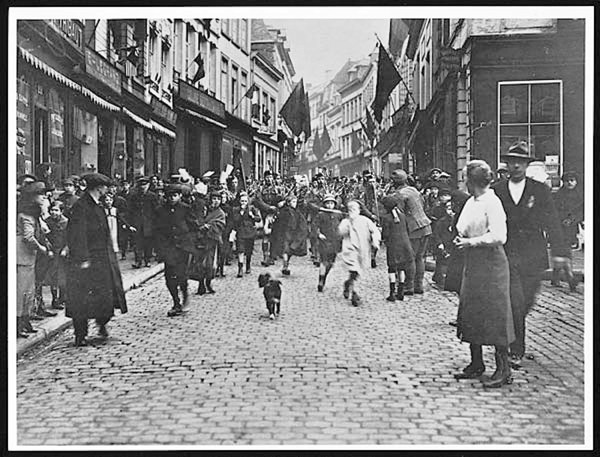11th November 1918 Armistice Day
The end of the war but not the end of suffering
The last known Blencowe to die in the Great War was Albert Blencowe. He died 40 days before the 11th November 1918. Albert Blencowe (1877-1918) Royal Irish Rifles. Son of Henry and May Blencowe, of Bicester, Oxfordfordshire and husband of Alice Amelia Blencowe, of 109 Bolingbroke Grove, Wandsworth Common, London.
Alberts body was found in a field near Dadizeele, Belgium alongside 13 more comrades who all perished in the Fifth Battle of Ypres, 1st October 1918. He was 41.
What was happening to some other members of our family on the last day?
Claude Franklin Blincoe (1888-1955) and his U.S. 353rd Infantry was involved in a fierce street battle in Stenay and was wounded just 6 hours before the 11am hour that was the official war end. Son of Franz Siegle Blincoe Loudon, VA.
Frederick William Blincowe MC East Surreys (1890-1970), was recovering in billets at Pommeruil after losing 63 men from his battalion just days before the Armistice. Son of Frederick Blincow.
Henry Blinko (1880-1944) 10th Bn. Kings Royal Rifles,sat out the last day in complete ignorance of its significance. He was in Altdamn POW Camp struggling to get enough to eat. Son of John Blinko.
Charles William Blincow (1884-1950) Somersets, had crossed the Scheldt on the 9thNovember and two days later the advanced units of his division crossed the Dendre (Dender) Canal. When the Armistice came into effect they had occupied Athens. Son of Richard Blincow.
William Arthur Blinko (1896-1961) Lancashire Fusliers, had reached MaubeugeAvesnes-sur-Helpe road on the last day. The battalions successful thrust had taken them far into enemy territory. Son of James Henry Joseph Blinko.
At 11am on the 11th November the war ended for all
However, many returned home ill,badly damaged physically and mentally scared. PTS was an illness not widely recognised and not treated well.
Many suffered for years and their stories are unknown and sadly cannot be told. There are a few whose stories we do know and should recognise.
William (Billy) Blencowe (1865-1918) 23rd Bn. AIF was invalided home after being torpedoed in 1915 on his way to Gallipoli. An older man, he never really recovered from wounds and illness caused by this event and died less than a month after the wars end in 1918. Son of John & Emma Blencowe, Melbourne
Frederick Blincoe (1877-1919) Royal Berks, came home wounded and sick and lasted only three months. He died 20th February 1919. Probably,the son of Richard Blincoe. London.
Valentine Blencowe (1885-1923), Kings Royal Rifles: was gassed in the war and never recovered from the damage to his lungs. He died in 1923 from the damage caused. Son of Tom Blencowe.
Leonard William Blincow (1895-1922) Royal Artillery Died of war wounds or illness in 1922 age just 27. Son of Edward Blincow. Shipston.
Widower Jonah Blincoe of Chearsley in Buckinghamshire had two sons come back from the war only for both of them to die within 2 years. William John Blincoe (1876-1919) Royal Warwicks died either from illness or wounds and brother Sidney Blincoe Army Services Corps (1889-1920) died after being gassed at the front delivering supplies to the trenches.
Many more likely perished in lives shortened due to war related illness and wounds. We do know that on average, men of this generation rarely got past 70 years old.
Roger Blinko,
Canada

Canadians marching through Mons on Armistace Day